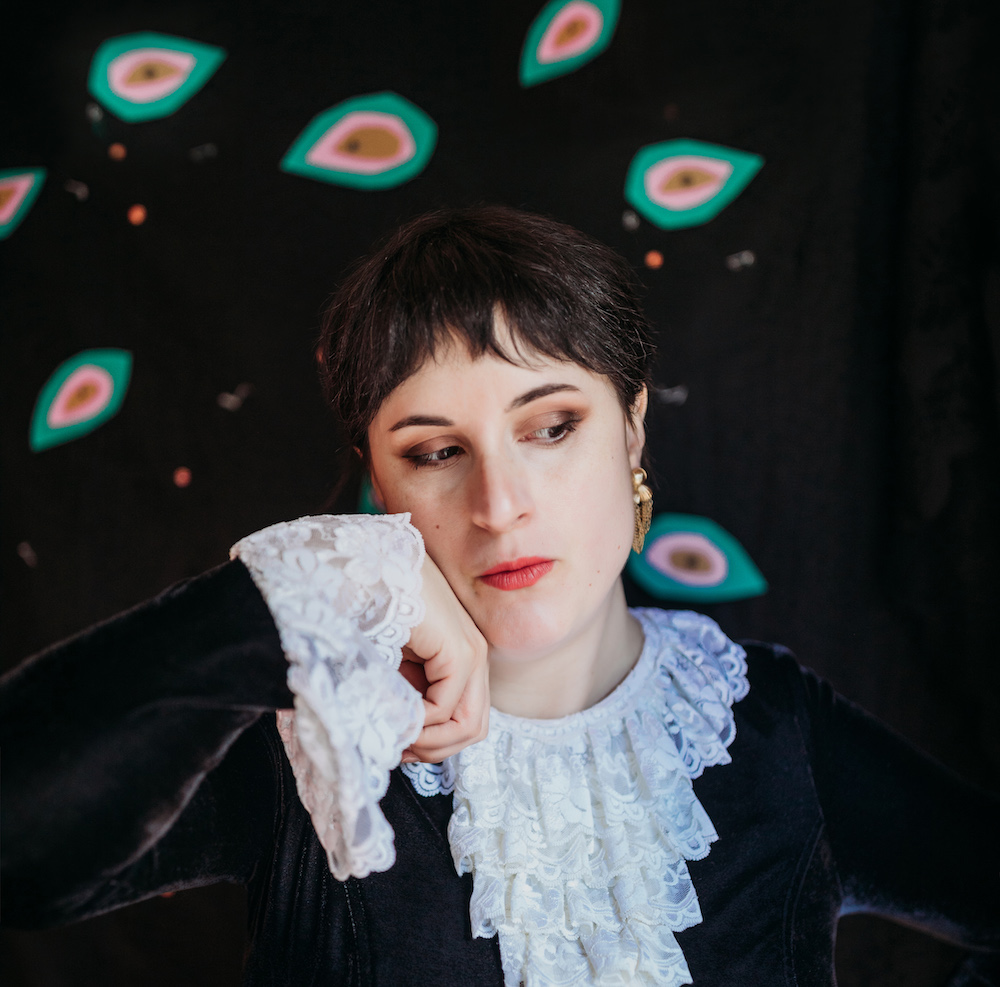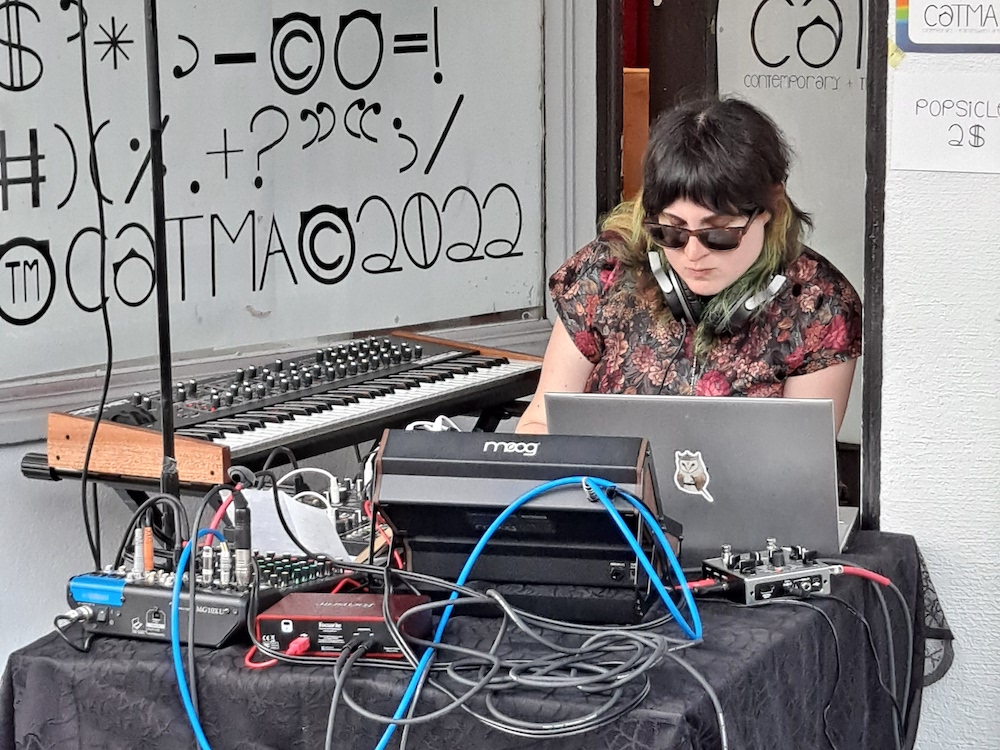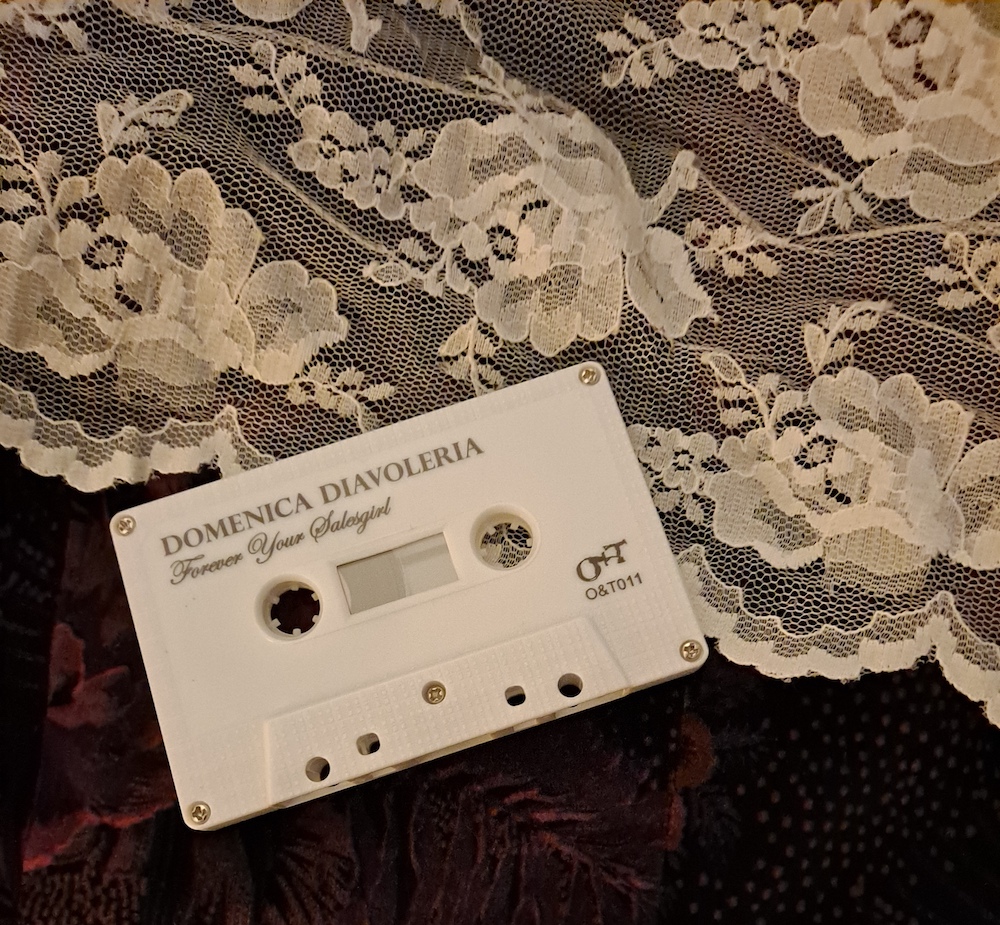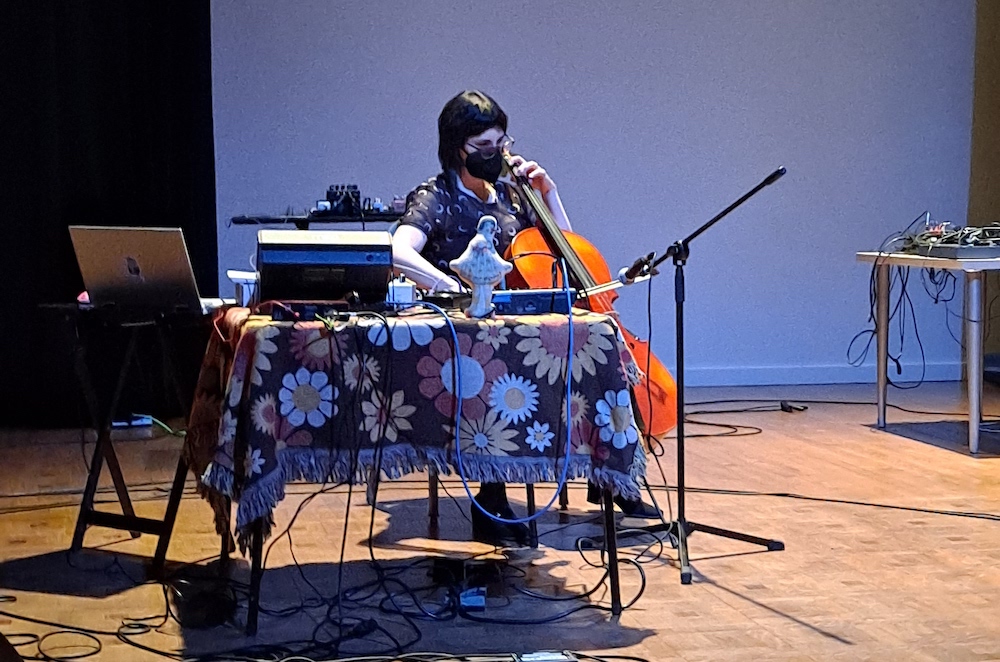
Domenica Diavoleria: Forever Your Dark-Ambient Woman
by Dave Segal
October 17, 2024
Domenica Diavoleria got a relatively late start producing electronic music, but the Olympia, Washington musician/DJ is making up for lost time with three excellent dark ambient albums and an EP this decade, plus a forthcoming live score to Neil Jordan's 1984 gothic horror film, The Company Of Wolves. You can experience that event on October 30 at the Olympia Timberland Library, which happens to be the bookish Diavoleria's favorite place.
The road to this rarefied realm of musical creation began with a deep love of the Doctor Who theme, which Diavoleria (government name: Domenica Clark) heard on PBS in the '80s— "peak Tom Baker era," as she notes in an interview we conducted over email.
That theme "altered my brain forever," Diavoleria says. "I am definitely not alone in getting one’s first exposure to electronic music through hearing that Delia Derbyshire composition.
I also have to shout out the use of Isao Tomita on PBS’s Star Hustler program. I clearly had a penchant for those [synthesizer] sounds early on."
In addition, Diavoleria loved pop music, but began exploring “alternative” music in the '90s, particularly Radiohead, Bauhaus, and Belle and Sebastian, among others. Although she lived in the cultural desert of suburban south Florida in the '90s, Diavoleria "ravenously devoured music and underground culture as much as I could. It was very hard to access any sort of underground music that wasn’t in SPIN or Rolling Stone or on MTV’s 120 Minutes."
At 16, she moved to Washington and made connections with the underground-music scene. She was reading The Rocket and The Stranger and listening to KCMU (now KEXP), and shortly after enrolling at Evergreen State College, scored a DJ slot at the Olympia college radio station KAOS in Olympia.
"I was hungry for every type of music there was, no matter when it came out," Diavoleria says. "I listened to everything I could, and found myself becoming increasingly interested in noise and experimental music in my 20s. I became a devotee of the freeform radio format, an approach that I embraced in all my future radio endeavors. I was perpetually excited by having genres played next to each that didn’t obviously go together. This also manifested in things like when I helped organize Ladyfest 2005 in Olympia and the Olympia Experimental Music Festival."
Attending Seattle's Decibel Festival and Debacle Records' MOTOR nights, plus other niche electronic events in the 2010s accelerated Diavoleria's interest in electronic and dance-oriented music. "I was still DJing then on Hollow Earth Radio, for 10 years, and was showcasing my preferred genres at the time—ambient, '60s girl groups, '80s R&B and femme pop, eurodisco, and experimental stuff, among other things. "It was a heady time of being 'on the scene,' sadly DJing to mixed success, including my esoteric Gentlemen Take Polaroids night. I also learned how to DJ dance music properly on vinyl at the Spread Thick night, which focused on boogie and disco. Either way, much of this music was drawn together by my overarching love of electronic music."
The artists who especially inspired Diavoleria to make her own music form an impressive pantheon: Panabrite, Donato Dozzy, Conrad Schnitzler, Rafael Anton Irisarri, Sarah Davachi, Christina Vantzou, Chuck Johnson, and Pinkcourtesyphone (Richard Chartier).
As mentioned, Diavoleria, 41, was a late bloomer compared to most electronic musicians. Her first release, the night is my world, arrived in 2021. As it turns out, there are good reasons for this delay: self-doubt, anxiety, and depression. "I had wanted to do music for most of my life, outside of all the childhood training I had in piano, cello, and guitar playing in various youth orchestras and recitals, etc. I dabbled in bands in my teens and 20s, but nothing really went anywhere and everything I did I felt like it was definitely never good enough. In retrospect, it was clear I was dealing with very serious untreated depression.
"It wasn’t until I was really effectively treated for depression and anxiety in my mid 30s that I felt ready and had the capacity to make my own music. Before that, it felt hard to see how I could possibly make anything worthwhile that anyone would want to listen to. It is definitely kind of sad and I still feel like I am trying to make up for lost time.
"There was also the technical and financial aspect—I assumed it would be expensive to make the electronic music I wanted to make. I kind of couldn’t afford it until that age! I use Ableton as my digital audio workstation and that alone is not cheap. Add on top of that my desire to use synthesizers, much like my electronic music heroes Norm Chambers (Panabrite), Christina Vantzou, and Richard Chartier, and it just isn’t cheap.
"Now that I know Ableton and am familiar with tools like Madrona Labs products, I realize there is a way to make electronic music that doesn’t necessarily involve a wall of synths, like I am in TONTO's Expanding Head Band or something. But to get some of the sounds I love, synthesizers and modular synthesizers are still necessary."
The ambient music that Diavoleria creates skews toward the desolate, minimal, and dark end of the spectrum. Does she view her studio work as therapeutic/cathartic? Did the pandemic lockdown color the tone of her first few recordings? Or does it go deeper than that? "I think the pandemic affected me making music in a way, because it led to me being more depressed than I had ever been. I was really unwell, and after I got treatment, it was then I felt I could finally make the music I heard in my head.
"There were a few months where I was unemployed between my extremely stressful job working directly with government beneficiaries in 2020 and getting a graduate fellowship for public administration work. I dedicated all my free time to learning how to make electronic music.
"Honestly, I wasn’t totally sure of what music I wanted to make when I started. I even thought it was maybe going to be more dancey, in the minimal-techno/ambient-techno vein. I especially loved the romanticism of Fort Romeau. "I took lessons in how to make dance music with an Ableton instructor and I found myself making ‘Domenica Diavoleria’ type music more and more, despite [the instructor] losing the battle in trying to get me to make modern house music. I found I was most inspired by abstract sounds and telling stories through unusual sounds. It was the most exciting for me!
"Anyway, even though I am a certified depressive, I don’t think the music has ever served as therapeutic or cathartic. I think the way in which it is therapeutic is [that it's one of] the most fulfilling things I have ever done. I have been frustrated by trying to express myself for decades. I was also concentrating on creative writing for most of my 20s and then DJing for most of my 30s. Neither of which felt quite right as far as spilling the contents of my brain in a satisfying way."
Forever Your Salesgirl (released in 2022 on Seattle label Obscure & Terrible) was partially inspired by Diavoleria's unsatisfying stints working retail and also a dream about an "extremely eerie, multi-storied department store. [I]n it, I was visiting all of these eerie tableaus in the building, and that showed me what the album was going to be about. And I knew it was also about my experience working in retail for most of my adult life in mostly incredibly depressing settings."
For four stultifying years, she worked at FedEx Office (aka Kinkos) in a mini-mall. "So I tried to wrench any kind of artistic endeavor I could from it. One of my favorite songs, 'Mirror Room Vacuum,' was about being entranced by a vacuum store across from the Kinkos. I have always found such spaces strangely beautiful, which I attribute to growing up in the suburbs, but the suburbs of Florida, so I am also perpetually inspired by the encroaching morass of the Everglades. Mini-malls can be swallowed up at any time!
"I devised a loose story of sorts about early-20th-century shop girls haunting a department store. I am also an avid reader of academic history books, and I was inspired by books I had about the lives of young women working in early- to mid-20th-century retail and how their leisure time was spent. This also aligned with my underlying mission to bring my experience of feeling alienated as a woman in electronic music and music in general, so I was like
'yes, this noisy album is going to be about women stuck behind a counter.' I wanted to also do something unconventional as far as the premise of the album."
That she did. Forever Your Salesgirl is as haunting as a stroll through an abandoned mall in a sparsely populated town. With the most wispy elements—vaporous synth drones, sampled mutters, fragile percussion touches, blurred, poignant melodies—Diavoleria captivates with an unsettling chillness. The Caretaker sounds bombastic by comparison.
Orange Clearing (released this year by Seattle imprint Eiderdown) is a more fuller-sounding record than Salesgirl and has a more varied sonic palette. That evolution occurred through practice and refining her craft, plus taking two classes with Olympia composer Ben Kamen at the Evergreen State College and an online course with Sarah Belle Reid. "It was just time, practice, and knowledge building."
Promoted as a children's album, Orange Clearing was written and mixed while Diavoleria was pregnant with her first child. Let's be clear, though: most children will have trouble processing the record's melancholy moods and desolate atmospheres. "Whirligig" may be named after a cherished fairground ride, but in Diavoleria's hands it becomes a conduit into a realm of microcosmic mystery. Named after a long-gone Seattle Center attraction, "Fun Forest" contrasts a soothing drone with subliminal strains of discomfort beneath the salubrious tones. The track exemplifies her knack for imbuing her ambient music with a crucial tension.
Diavoleria speaks highly of the role that Madrona Labs instruments and software play in the creation of her music. "Madrona Labs has been incredibly helpful and I often use their software for my music. At first, when I didn’t understand synthesis that well, I virtually turned random knobs and buttons until I found a sound I like. As my understanding of synthesis deepened, I have come to understand how exactly Madrona Labs products like Kaivo and Aalto work. I also think they are helpful tools for visualizing how synthesis works, especially for someone like me who struggles with technical aspects of production. I also love their Aaltoverb tool, I would love more reverb-y stuff from them, please.
"I also use Ableton and love it so much. If I got tattoos maybe I would get one of the Monolake guy [Robert Henke], because I just adore it.
"To make my music, I use samples, based on random sounds I collect, my cello, vocals, my modular setup, my other synths and various plug-ins like the Madrona Labs ones, which are my favorite of the plug-ins I have.
Plug-ins kind of get a bad rap, but I am not a sound snob. I will take whatever sound."
Looking to the future, Diavoleria is working on her next album, which she projects will come out in 2025. Her immediate goals are to "become a better musician and become more well-known (within reason, of course!). I am aware my music is still missing some element that will take it to the next level, but I am not sure what that is yet. I also am still fighting feeling like I am not good enough, so there is a battle between trying to let things be and trying to be 'better,' whatever that means for me."
Right now, she is most excited about composing a new score for Neil Jordan’s The Company Of Wolves. "There is already a soundtrack for it, but I am doing an altogether new one specifically for the Timberland Regional Library live performance series. It is a lot of work and it will be entirely composed and performed by me. That movie is one of my favorites and it perfectly suits my music thematically. It is about girlhood, sexuality, and it is an eerie yet playful film. Just like my music!"


